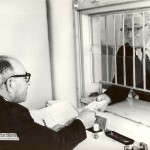The tax year – Re’eh
 This Shabbat our subject is taxes.
This Shabbat our subject is taxes.
A bad joke? A forced attempt to be topical?
In fact it is one of the themes of the sidra.
“Set aside each year a tenth of your produce,” says the Torah. “Consume the tithes … in the presence of the Lord your God in the place which He chooses to establish His name, that you may learn to revere the Lord your God forever” (Deut. 14:22-23).
This is part of the tithing system of the Torah. Certain tithes had to be set aside for the sanctuary; the tithe described in the sidra was enjoyed by the citizen himself.
He would take it to Jerusalem and eat it there, or, if this was impracticable, it could be redeemed and the money used in Jerusalem.
But if he was going to have the benefit of the tithe himself, why go through all this rigmarole? Why not simply eat it without further ado?
The answer is given by the text itself. The purpose of this particular tithe is intellectual (l’maan tilmad – “so that you may learn”) and emotional (l’yirah et HaShem – “to revere the Lord”).
What the Torah is saying is, “Set aside time and money to be a Jew. Do not say, ‘Some day, when I have time and money, I may decide to study Torah; some day, when life is less hectic, I may go to Israel to experience Jerusalem for myself’.”
If being Jewish is a blessing, don’t wait to enrich your Jewish heart and mind.
Whatever your constraints, you can always afford enough time and money to deepen your Jewish knowledge and feeling.
Our Talmudic ancestors had a sophisticated adult education system. Two months a year, Adar and Ellul, were yarchei kallah, set aside by the ordinary person for in-depth study.
Why Adar and Ellul?
One answer is that these months lead up to the two peak periods of the year, Pesach in Nisan and Rosh HaShanah in Tishri. The great days of the calendar are lent meaning if we have given ourselves the opportunity of pondering their themes and delving into their laws: timely advice this Shabbat, a month before Rosh HaShanah.
In ancient days the tithe brought you to Jerusalem, where the Sh’chinah is found more than anywhere else on earth.
It has been said that everyone feels religious in Jerusalem. Not so much if you keep to the precincts of a top hotel. But walk the streets, ride the buses, watch the passing parade, stand silently at the Kotel, wander through a market, taste a yeshivah and, above all, absorb Shabbat, and the experience defies all comparison.
The value to heart, soul and spirit of a visit to Jerusalem is unbelievable. The eternal capital of Israel is the most majestic source of the Jewish mystique.
Every Jew should spend whatever time there that they can afford, and find that the tithe that brings you to the holy city truly gives to its giver.



